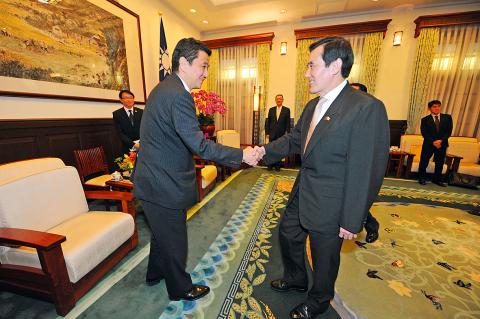President Ma Ying-jeou (馬英九) yesterday reiterated during a meeting with a visiting Japanese politician that Taiwan hopes to seek international arbitration on the Okinotori atoll dispute.
Ma told Japanese Legislator Nobuo Kishi that if Taiwan and Japan cannot solve their dispute over the atoll, the two sides should submit the dispute to international mediation and arbitration.
Over the past eight years, relations between Taiwan and Japan have been the best they have ever been since the two nations severed formal diplomatic ties in 1972, Ma said.

Photo: CNA
However, Japan’s detention of the Taiwanese fishing boat Tung Sheng Chi No. 16 “could have some negative influence on this relationship,” Ma said.
After the boat was detained by the Japan Coast Guard near the Okinotori atoll on Monday last week, Japan demanded a security deposit to release the boat and its crew, and handcuffed and strip-searched the boat’s captain, Ma said.
“Taiwanese are shocked and angered by these actions,” Ma said.
Okinotori is only 9m2 and its two reefs are only 16cm above sea level, which means that it has no fresh water and is unable to sustain human habitation or economic life, he said.
He cited Article 121 of the UN Convention on the Law of the Sea as saying that reefs that cannot sustain human habitation or economic life are not entitled to an exclusive economic zone.
Despite this, Japan claims a 200 nautical mile (370km) exclusive economic zone around the atoll.
Two Taiwanese patrol boats yesterday reached international waters near Okinotori in an effort to increase protection of Taiwanese fishermen operating in the area, the Coast Guard Administration (CGA) said.
With official vessels from both Taiwan and Japan near Okinotori, Ma said he hopes the two sides restrain themselves and avoid conflict that could affect friendly relations between the two nations.
The CGA said that when encountering Japanese patrol boats, it would adhere to the principles of no provocative action, no confrontation and no evasion.
However, if any Japanese patrol boats attempt to approach Taiwanese fishing vessels operating near Okinotori, the coast guard would take immediate action to ensure the safety of the fishermen, which could include dispersing any Japanese vessels, it said.
The CGA said it has not ruled out dispatching more vessels to waters near Okinotori to protect Taiwanese fishing boats.

Taiwan is gearing up to celebrate the New Year at events across the country, headlined by the annual countdown and Taipei 101 fireworks display at midnight. Many of the events are to be livesteamed online. See below for lineups and links: Taipei Taipei’s New Year’s Party 2026 is to begin at 7pm and run until 1am, with the theme “Sailing to the Future.” South Korean girl group KARA is headlining the concert at Taipei City Hall Plaza, with additional performances by Amber An (安心亞), Nick Chou (周湯豪), hip-hop trio Nine One One (玖壹壹), Bii (畢書盡), girl group Genblue (幻藍小熊) and more. The festivities are to

Auckland rang in 2026 with a downtown fireworks display launched from New Zealand’s tallest structure, Sky Tower, making it the first major city to greet the new year at a celebration dampened by rain, while crowds in Taipei braved the elements to watch Taipei 101’s display. South Pacific countries are the first to bid farewell to 2025. Clocks struck midnight in Auckland, with a population of 1.7 million, 18 hours before the famous ball was to drop in New York’s Times Square. The five-minute display involved 3,500 fireworks launched from the 240m Sky Tower. Smaller community events were canceled across New Zealand’s

‘IRRESPONSIBLE’: Beijing’s constant disruption of the ‘status quo’ in the Taiwan Strait has damaged peace, stability and security in the Indo-Pacific region, MOFA said The Presidential Office yesterday condemned China’s launch of another military drill around Taiwan, saying such actions are a “unilateral provocation” that destabilizes regional peace and stability. China should immediately stop the irresponsible and provocative actions, Presidential Office spokeswoman Karen Kuo (郭雅慧) said, after the Chinese People’s Liberation Army (PLA) yesterday announced the start of a new round of joint exercises around Taiwan by the army, navy and air force, which it said were approaching “from different directions.” Code-named “Justice Mission 2025,” the exercises would be conducted in the Taiwan Strait and in areas north, southwest, southeast and east of Taiwan

UNDER WAY: The contract for advanced sensor systems would be fulfilled in Florida, and is expected to be completed by June 2031, the Pentagon said Lockheed Martin has been given a contract involving foreign military sales to Taiwan to meet what Washington calls “an urgent operational need” of Taiwan’s air force, the Pentagon said on Wednesday. The contract has a ceiling value of US$328.5 million, with US$157.3 million in foreign military sales funds obligated at the time of award, the Pentagon said in a statement. “This contract provides for the procurement and delivery of 55 Infrared Search and Track Legion Enhanced Sensor Pods, processors, pod containers and processor containers required to meet the urgent operational need of the Taiwan air force,” it said. The contract’s work would be